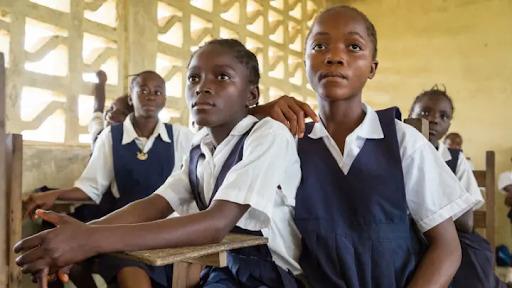Liberia: The Young Girl’s Time Is Now — Their Rights, Their Future

Students share a desk at a public school in Liberia. Photo by: Kelley Lynch / Global Partnership for Education / CC BY-NC-ND
Ms. Bidisha Pillai, Country Representative, UNFPA Liberia
Today, nearly half of the students enrolled in Liberian Early Childhood and Primary Education are girls. While the gender gap in primary school enrollment has narrowed, girls are still more likely to be out of school than boys among primary and lower-secondary age groups. Girls are also less likely to complete primary school and enroll in secondary schools.
According to the Ministry of Education Annual School Census 2019-20, the percentage of girls in primary school is 51 percent compared to 49 percent in Secondary Education.
The decline in the number of girls that attain secondary education in Liberia may be attributed to several factors, including early pregnancy. For example, about 36 percent of girls are married or are in a union by age 18. Nearly half, forty-four percent, of girls aged 15-19 are subjected to female genital mutilation, which might also force them to drop out of school.
Unplanned and early pregnancy jeopardizes the rights, health, education, and potential of the Girl child, robbing them of a better future. This is compounded by the lack of information and agency to make informed decisions about their sexual and reproductive health and rights.
Early pregnancy is not just a health issue but a development issue. It is deeply rooted in poverty, gender inequality, power imbalances between girls and their boy partners, lack of education, and the failure of systems and institutions to protect their rights.
Yet, evidence tells us that the benefits of girls’ education, especially secondary education, are far-reaching: delayed age at marriage and childbirth, fewer maternal and infant deaths, lower fertility rates, lower risk of HIV infection, and increased economic and political participation.
Breaking the adolescent or teenage pregnancy cycle requires nations, communities, and individuals’ commitment to invest in their Girls. Adolescents and young girls must be provided with age-appropriate comprehensive sexuality education to develop the knowledge and skills they need to make informed choices, protect their health, and realize their full potential.
One of the things we know works is investing in the sexual reproductive health of adolescents and young people, especially girls. Providing a gender-sensitive, age-appropriate, and life skills-based Comprehensive Sexuality Education (CSE) to adolescents and youth in and out of school is essential. It is one of the surest investments a country can make for its sustainable future.
Since June 2016, UNFPA has directly supported the Government of Liberia and worked with communities to deliver sexual reproductive health and family planning information through gender-sensitive, age-appropriate, and life skills-based Comprehensive Sexuality Education (CSE) to both in and out-of-school adolescents and youth.
This is then complemented with a set of interventions, including capacity building of institutions and harmonized community structures to deliver quality youth-friendly sexual and reproductive health services. The services are provided in public health facilities, schools, youth centers, and community safe spaces in the Southeastern counties. Based on its success, the programme is now expanded gradually to other counties with the support of the Government and partners.
During a recent field visit to Bong and Nimba counties with our partners, I met many young girls and boys who acknowledged the change that this programme is bringing to their lives. They are confident in their knowledge about their bodies, and their rights and are able to stand up, negotiate for, and claim their rights.
At the Sanniquellie Central High School in Sanniquellie, Nimba County, we heard that female student drop-out had been reduced due to the CSE programme, culminating in high participation and successful completion of the 2022 West African Senior School Certificate Examination.
On the International Day of the Girl Child, 11 October, I call on individuals, communities, national institutions, and stakeholders to take measures that enable the Girl Child to make informed life choices and to provide the necessary support for her in cases when her rights are threatened. Every young girl has the right to fulfill her human potential regardless of where she lives or her economic circumstances. Today, too many girls are denied that right. We can change that, and we must. One girl at a time.
Editor’s note: The views expressed in this commentary are solely of the author and do not necessarily represent that of the Daily Observer newspaper.
